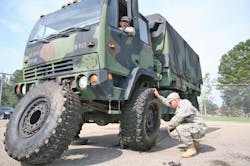When it comes to it, a job like driving a heavy-duty truck on U.S. roadways is different than many you'll find in the civilian sector — it's more regulated and structured, for instance, and involves operating more serious hardware than many potential new hires would be comfortable doing. Military veterans' experience often gives them an edge in being successful in that role and other trucking industry positions, says Jason Schenkel, who recently joined southeastern U.S. motor carrier Holland as a hiring manager.
He should know. Before this, Schenkel spent 16 of his 23 years of active duty in the Army as a professional recruiter helping find young men and women who would serve and someday become part of that veteran population. "I was selected as a detailed recruiter back in 1998," he tells Fleet Owner, adding that he enjoyed the work so much that he made recruiting his specialty.
Schenkel notes that veterans often have experience with heavy-grade equipment, and at an early age, so operating vehicles like a heavy truck hauling freight is a readier fit than it is for other would-be applicants. "I could come right out of high school at 18 years old into the Army, Navy, Air Force or Marines," he says, "and they could put me into an 80-ton truck, tank or other vehicle, license me on it and let me drive it around.
"At 18, 19, 20 years old, [many veterans] learned to do that and also handle stress and make decisions — possibly life-altering decisions — in tough situations, in some cases while leading others," Schenkel continues. In the frenzied, congested conditions America's highways and byways present on a daily basis, he contends, "that's why veterans can do so well."
PHOTO GALLERY: Veterans' experience can translate well to trucking
That sort of experience is one of the reasons trucking companies, which have long faced a driver shortfall that's projected to grow significantly in the coming years, are doing more to reach out to veterans to fill needed positions. Another is the more regimented, structured nature of driver and other trucking industry jobs, which Schenkel says can be a difficult adjustment for new hires.
"Look at the operational structure and business environment [of trucking] in terms of the leadership and rank structure of the military," he explains. "They're very similar, so veterans know that same kind of structure." It's not just the tighter restrictions and controls that go with the job, Schenkel points out, but how about the time away from home truck drivers often face that can make the job more stressful?
Again, Schenkel says veterans have an advantage in that their families are more used to — and often are even built around — schedules that include such away time, and likely for longer periods than a job in trucking would involve. Sometimes, he says, military families can have a harder time adjusting from active duty life to a more conventional 9-to-5 civilian job.
"For a truck driver, can your family operate and do what they have to do when you're gone? Most military families do not have issues doing that," Schenkel says. "So veterans probably have a better opportunity to adapt to the environment, be successful at it and come onboard a lot faster than most new hires would."
Outreach necessary
Another point that Holland and its YRC Worldwide parent — and indeed, many other motor carriers — frequently make about hiring veterans is that these men and women have the kinds of personalities and qualities they want in employees. Start with this: part of the job description of serving in the armed forces is you may have to put your life on the line for your country, and that takes a certain kind of person.
"We've found that these servicemen and women and the traits they have — respect for authority, familiarity with a structured environment, the personal responsibility they take in performing a job well done — it's a match right-on for the positions we have and the individuals we need to fill them," says Holland's Director of HR Stacey VandeVusse. "They've helped us continue to move forward and be successful as a company.
"With the situations drivers can find themselves in today, we need them to perform their job in that heavy piece of equipment they're operating safely — not only for their own well-being but the public's as well," she continues. "A lot of individuals coming out of the military already have the right skill set. We just need to connect that with the CDL so they meet Dept. of Transportation [DOT] requirements."
There's a catch with that military personality type and mindset, though. Along with things like a strong sense of honor, duty and responsibility, Schenkel contends that many veterans aren't the type to ask for help. "Me being one, you're humbled. When people offer you help, many times you want to turn it down," he tells Fleet Owner.
"It's important that we understand veterans have a lot to offer — today's military is probably smarter and better educated than any we've had in the past," Schenkel says. "Veterans have the ability and the talent to bring any organization to the next level, but some of them do need help. That's my passion — I want to help my fellow brothers and sisters in arms."
"At the same time, the transportation community needs to hire people," Schenkel notes. "We need to find different avenues to go out and achieve our hiring goals as well." In one example of that, Schenkel says he'll be focused on reaching out to veterans about available positions, including at an Aug. 18 hiring fair at Fort Benning, GA. Holland and YRC Freight have partnered with FASTPORT, a trucking-specific veteran hiring organization, which offers such events periodically.
You don't have to look far to find other motor carriers courting veterans — many showcase veteran hiring programs and enticements on their business' home page. You'll find companies like Swift Transportation and C.R. England waiving tuition fees for CDL training for veterans, or others like Schneider and US Xpress touting higher starting pay and benefits.
Carriers including TMC Transportation, Con-way Truckload and Werner Enterprises highlight and help streamline the process for veterans to apply for government benefits such as a tax-free housing stipend under the Post-9/11 G.I. Bill that can supplement income during driver training and apprenticeship programs. The Federal Motor Carrier Safety Administration allows states to waive the skills test portion of the CDL application for active duty and recently separated veterans with two years' or more experience operating a military truck or bus safely. Under federal law, states can also waive CDL residency requirements for active duty servicemen living in the state, making it easier for soldiers to get started as drivers where they're last stationed.
Will it be enough?
On the surface, the fit looks good: thousands of veterans already have or are returning to civilian life from deployments in places like Iraq and Afghanistan even as the trucking industry needs more workers like them. What's left yet to be seen is whether the trucking industry — which faces a number of challenges that contribute to the current driver shortage — can attract and keep them, notes Rebecca Brewster, president and CEO of the American Transportation Research Institute (ATRI).
"The veteran population is a very viable cohort to help us deal with the increasing need for commercial drivers," she tells Fleet Owner. "But there are a number of forces at play that we need to collectively address as an industry so that this is a place where we are able to keep the good folks we have and be an attractive career of choice for returning veterans and younger individuals."
During a conference call earlier this year hosted by research group Stifel Nicolaus & Co., Brewster discussed the current truck driver shortage and underlying causes. "Among the issues that I pointed out as having an impact on our ability to retain/recruit new drivers are truck parking (or the lack thereof), regulatory impacts from things like DOT's [hours-of-service rules] and [the Compliance, Safety, Accountability program], driver health and wellness, and the state of the nation's infrastructure and the growing congestion issue," Brewster notes.
Another point that came up in the conference call is that the U.S. truck driver population is aging, with a noticeable shift toward fewer young workers and more older ones. According to ATRI data, in 1994, 40% of truck drivers were 34 years old or younger; by 2013, that number had dropped to 21%. Some 31% of truck drivers were 45 or older in 1994, which grew to 56% in 2013.
Schenkel says bringing more young veterans into trucking and making it a viable career for them should be motor carriers' goal. "That's kind of what we're looking at in our industry as well is how we're going to grow the next generation of drivers, logistics specialists and so on," he says, noting that outreach efforts like veteran-centric hiring fairs are "one avenue for us to do that."
"It's a win-win — the transportation industry needs veterans, and we need to give back," Schenkel says. "Remember, truck drivers are out there as part of the vision of their company every single day. Veterans' core values — loyalty, honor, self-discipline — allow companies to put the trust and confidence in veterans that they will go out on the road and represent them well."
VandeVusse points out that providing drivers the opportunity to advance is part of the equation. "We have a number of employees that started as a driver and were able to move to management-level positions," she says. "We're going through a process right now where we have many, many veterans who work for our organization; we're trying to find out who they all are and recognize them. We want to thank them for their service to our country and to Holland and YRC as well."
About the Author
Aaron Marsh
Aaron Marsh is a former senior editor of FleetOwner, who wrote for the publication from 2015 to 2019.

